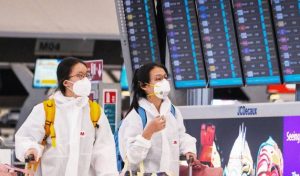London, United Kingdom, June 20, 2020 / travelindex.com / Holiday hotspot Egypt, is the latest in a line of popular destinations around the world to sign up to the world’s first ever global safety and hygiene stamp, launched recently by the World Travel & Tourism Council (WTTC).
The growing list of endorsements have come from many major holiday and city destinations around the world such as Aruba, Slovenia, Ukraine, and Vienna, among many others.
WTTC, which represents the global Travel & Tourism private sector, designed the special Safe Travels stamp to enable travellers to identify destinations and businesses around the world which adopted its health and hygiene global standardised protocols – so consumers and holidaymakers can experience ‘Safe Travels’.
The United Nations World Tourism Organisation (UNWTO) embraced the WTTC Safe Travels stamp, which have the safety and hygiene of travellers as its top priority.
Gloria Guevara, WTTC President & CEO, said: “We are delighted to see major countries and destinations such as Egypt and Slovenia joining the growing list of global destinations adopting our private sector protocols.
“This not only shows the success of the WTTC Safe Travel stamp, but also demonstrates its importance to travellers and those who work in the sector.
“The stamp is critical to re-establish consumer confidence in Travel & Tourism and ensure travellers can rest assured that enhanced standards of hygiene are in place.
“As WTTC health and hygiene protocols, affecting hotels, restaurants, airports, cruise lines, tour operators, restaurants, outdoor shopping, and transportation are implemented, so the list of destinations recognising the new stamp continues to grow.
“We thank these destination countries and cities for working with WTTC to ensure a speedy recovery of the sector. We look forward to welcoming many more destinations as countries around the world begin to lift travel restrictions which will see people travelling again.”
Since the launch of the WTTC Safe Travels stamp, destination countries, cities and hotspots around the world such as Turkey, Bulgaria, Mauritius, Panama, Portugal, and the Mexican State of Jalisco, have now adopted WTTC’s new protocols.
Dr Khaled El-Enany, Egypt Minister of Tourism and Antiquities said:
“I am pleased with the decision issued today by the WTTC to grant Egypt its Safe Travels stamp. This is a milestone in our bilateral cooperation with WTTC. This decision reflects Egypt’s commitment to the safe resumption of inbound tourism with strict comprehensive hygiene safety measures starting July 1, 2020, to its superb, sunny and healthy beaches.
“We are looking forward to welcoming guests to Egypt’s resorts in the Red Sea and the Mediterranean Coast.”
Iván Eskildsen, Panama Minister of Tourism, said:
“As the hub of the Americas, restoring confidence for travellers and tourists, will be a key factor for the reactivation of our industry and our economy.
“The WTTC Safe Travels stamp is a great way of building trust, aligning the protocols we have developed with our Ministry of Health with WTTC standards, so that travellers can have a safe journey through our country.”
Ivan Liptuga, President, National Tourism Organization of Ukraine said:
“We commend WTTC for the strong initiative to design Safe Travels protocols for every link in the tourism value chain. One of NTO Ukraine’s core activities is quality management and the implementation of international standards in the sustainable development of tourism in Ukrainian destinations.
“The implementation of WTTC protocols and the distribution of a Safe Travel Stamp is vital for strengthening health and safety standards and also a great marketing tool which strengthens confidence and differentiates socially responsible businesses from others.”
Msc. Maja Pak, Director General of the Slovenian Tourist Board said:
“The Slovenian Tourist Board is proud that Slovenia is one of the first countries in the world with recognised Safe Travels Protocols approved by the World Travel & Tourism Council. Our instant reaction will help the tourism recover as soon as possible, and our common efforts with all the stakeholders have resulted in the GREEN & SAFE label, which represents Slovenia’s commitment to responsible, green, and safe tourism.”
WTTC recently launched a range of worldwide measures as part of its Safe Travels protocols, providing consistency and guidance to travel providers and travellers about the new approach to health, hygiene, deep cleansing and physical distancing, in the ‘new normal’ of COVID-19 world.
The protocols were devised following the experience of WTTC members dealing with COVID19 and based on guidelines from the World Health Organisation (WHO) and the Centre for Disease Control and Prevention (CDC).
According to WTTC’s 2020 Economic Impact Report, during 2019, Travel & Tourism was responsible for one in 10 jobs (330 million total), making a 10.3% contribution to global GDP and generating one in four of all new jobs.











